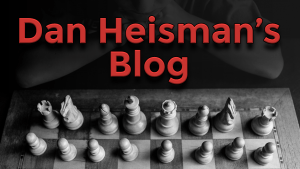Q&A with Coach Heisman Sep 13, 2013
Friday the 13th wasn't too unlucky for the show - we had lots of varied and interesting questions. Today's show was moved back an hour to allow for the finish of the telecast of the 4th round of the Sinquefield Cup.
One question involved the World Computer Chess Championship (or lack thereof). Ever since the Rybka and Houdini programs have had their code derivations legally questioned, the official WCCC has not been held. But that does not stop unofficial WCCC's from being held, and one is being held right now, with each slow game being played live on the web, one at a time. You can follow this interesting - and long-lasting - event at:
http://tcec.chessdom.com/live.php
There are forums and live chat on that site, and the crosstable and schedule are at the bottom of the page (scroll down). Right now its early in the event (in the sixth round of the first stage) and Gull 2.2, Stockfish 4, and Bouquet 1.8 leading the swiss at 4-1, with many of the well-known programs participating but trailing close behind: Houdini, Rybka, Junior, Shredder, Hiarcs, Crafty, Komodo... So far as I can see, the only "big" name program not competing is Fritz, but if you use the CCRL Ratings, Fritz is currently only tied for 13-14th, so it's not like it would have been a prohibitive favorite.
I get many questions about what is good and bad for your chess. In general, doing chess-related activities are usually good for "your chess" (more on what that means later). The real question is how well the activity you have chosen correlates with improving toward the specific goals you have chosen. For example, if you are trying to be a blitz champion than you might do things different than if you are trying to be a correspondence champion. If you want to play "live" chess and have trouble with visualization, then correspondence chess, while still helpful, may not be the best solution since in correspondence you are allowed to "move" the pieces and so visualization, while still there, is not the most practiced skill. We could use this same logic to apply to almost any chess activity, whether it be Chess960, Bughouse, Blitz, doing easy or difficult tactics problems, paying for lessons, playing in tournaments, or whatever. Each can contribute, but how much it contributes toward each particular goal can be a very complex question which would depend on many issues, such as your current needs and how you are practicing that particular activity. So we can't just simplify and say "blitz chess is bad for your chess" - that doesn't make sense outside of any context, especially if "your chess" is blitz chess!  (BTW, for non-beginners, blitz chess, practiced correctly, is good for "your chess" - see Getting the Edge)
(BTW, for non-beginners, blitz chess, practiced correctly, is good for "your chess" - see Getting the Edge)
One question was about playing without a clock (I call this "skittles" but that is no means a standard definition). My first thought on seeing this question was that even correspondence has a clock - it usually is a limit of a move every three days. Playing completely without a clock is somewhat similar to playing football or basketball without a clock - it's a different game. The goal on each move in a regular (clock) game is to make the best move you can in a reasonable amount of time, given the clock and position. But what happens when you remove the clock? Then likely the goal changes to find the best move. Period. However, in some positions, that goal may not even be possible for humans within their lifetime!
Suppose you are in a super-complex position (in a skittles game) where you have one saving move, but it may take you days to figure it out. What do you do? What most people do is think for a while, but eventually give in to good game etiquette and move before their opponent gets upset. But having one person take a lot more time than the other - for any reasons - is usually unfair. The only way we can make it fair is to dole out equal thinking time to both players and see how well they can do - thus the invention of the clock. It's also a practical matter. Before the clock was used regularly in grandmaster events, spectators would ask for their money back because the grandmasters might only make a few moves during the day they attended! Not very practical. And once computers got really good, that spelled the end of adjournments and the augment of sudden death time controls, increments, and time delays. For a more full history of this, check out Time Management During a Chess Game, a pre-Novice Nook article (!) I wrote for Chess Cafe.
Someone asked about the controversial question of why the great majority of top chess players are male. This is a politically-correct charged question and I am no great expert, but I tried to give a reasonable answer (my initial inclination was to duck, but that seemed a little cowardly). The undeniable fact is that cultural bias has made it easier for males to excel at chess almost everywhere - maybe the Republic of Georgia was the exception. But is that the only reason? One study I saw (and I am sure there were others) some years ago suggested that in some left-brained activities, which includes chess, males had a bigger standard deviation of performance. In other words, the worst and best performing subjects were male. Whether this study was subsequently validated or made into rubbish I don't know, but it is an interesting conjecture. Again, I am no expert; this is something I read and passed along in the interests of the show, but it doesn't make it true  . To support the cultural aspect, in the US there are many young girls playing tournment chess but, by the time they are teenagers the social pressure often causes them to drop out. Thus the ratio of males to females, by the time they reach the high school level, is far greater than at the elementary. That ratio pretty much continues throughout adult years, although I think the ratio of male-female at US "all-ages" events is a little better now than it was many years ago (thank goodness!).
. To support the cultural aspect, in the US there are many young girls playing tournment chess but, by the time they are teenagers the social pressure often causes them to drop out. Thus the ratio of males to females, by the time they reach the high school level, is far greater than at the elementary. That ratio pretty much continues throughout adult years, although I think the ratio of male-female at US "all-ages" events is a little better now than it was many years ago (thank goodness!).
I am happy to announce that the second edition of The Improving Chess Thinker is now in layout (via publisher Mongoose Press) and should be ready for the holiday season. It is greatly expanded with about 60% new material, and some of the old material has been changed and rearranged for additional clarity. Much thanks for all the hard work by editor Jorge Amador and QA reviewers Troy Duncan and FM Rodion Rubenchik. Thinker is one of only three chess books of which I am aware which feature entire "thought process protocols" (thinking out loud to make a move) from many players. The others are the root Thought and Choice in Chess by Adriaan de Groot and Inside the Chess Mind by Jacob Aagaard. Silman's The Amateur's Mind is often thrown into this category but, if you read all four books, you will see that Silman's excellent book is a little different than the others since it mostly features just partial protocols. I believe The Improving Chess Thinker is the only book which has an extensive number of full protocols by players at all levels up to GM.
The next show Sep 27 will be open to diamond and platinum members.



